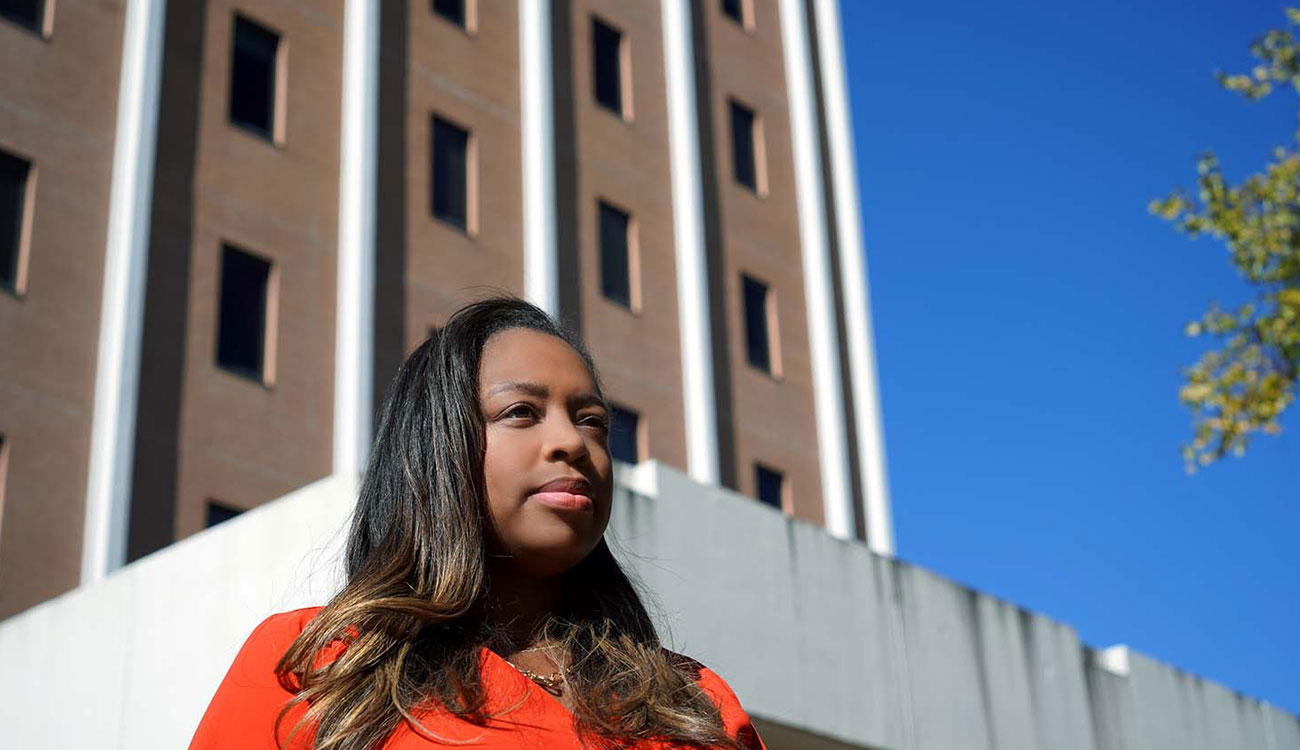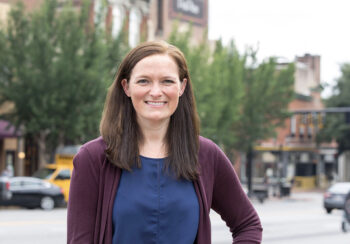When she worked as a school psychologist, Sycarah Fisher found that the students labeled “bad” were her favorite kids. As she dealt with them, she “learned to love them and realize that their behaviors are a symptom of a much larger problem.”
That much larger problem is now a central focus of her research as a UGA associate professor of educational psychology and collaborator at the university’s Center for Family Research. Her goal is to help counselors and social workers, as well as the entire school system, recognize that when students present with problem behavior, including substance use, the solution is not the harsh discipline that leads to a “school-to-prison pipeline,” but instead, evidence-based mental health services that take the context of the behavior into account.
It’s not that teachers and administrators do not care, according to Fisher, who serves as graduate coordinator in the Department of Educational Psychology at the Mary Frances Early College of Education. Most of them are “super hardworking, caring, loving and want the best, but there is a level of system disorganization that prevents real change,” she said. “I think it’s partially because you’re dealing with the population that has its own chaos going on.”
As one high school student described to her, his use of pot was a coping mechanism for the bedlam in his life. Taking this kind of context into account includes understanding the effect of race on substance-use practices as well as racial identity as a protective factor.
When Fisher left a school psychologist job in Washington, D.C., to become a college professor, she left in tears, telling students that her scholarly work was “going to make schools better places for you to be in.” It is a promise she is working to fulfill.

The roots of her selfhood and career
Fisher’s parents divorced when she was just 3 months old, and she lived exclusively with her mother in a duplex across the street from low-income housing. But wanting to improve their lives, her mother went back to school before Fisher started third grade, and to accommodate this, she moved in with her father where she lived much more affluently and attended better schools.
Going back and forth between these households, and watching her half-siblings grow up in very different environments, fueled her ability to depend on herself and gave her an unusual perspective.
“Seeing that my brothers sort of crumbled under those sort of adverse childhood experiences … made me really interested in studying resilience when I was in graduate school,” she said.
The interest was both practical and academic. “When they experience very similar things, what makes some people rise to the occasion and go above it, and what makes some people really just crumble?”
Clearly, Fisher has been rising from the start, though ironically, she was looking at her high school report card with her 10-year-old daughter recently and noticed she got a D in psychology—a class she remembers liking. Her surprised daughter said, “You got a D in the field that you work in?”
It caused Fisher to wonder what was going on in her life at that point. “Something needs to happen,” she recounted of her thoughts in late high school, “or otherwise, I’m going to still be in this constant sort of chaotic cycle.”
Rushing to success has been a theme in her life. She skipped first grade, finished college early, and has often been given responsibilities quickly in her work such as becoming director of the doctoral program in school psychology at Howard University after just one semester. It is hard not to wonder if she fits the mold of “John Henryism,” a concept which underlies much of the work at CFR. It is the idea that some African Americans are highly driven to succeed despite having to overcome circumstances that make success difficult, such as a lack of resources and having to overcome personal and systemic racism. Though they succeed, they pay a price in their health through increased metabolic disease caused by the long-term effects of stress.
“I definitely resonated with a lot of the things that he was saying,” she said of the conversation she led in an online symposium with the John Henryism theorist, Sherman James, though thus far stress-related disorders have not manifested (Fisher thinks regular exercise and meditation may have protected her).
But the psychology of race is certainly part of her story. Her father insisted on giving his children the best neighborhoods and best schools, and that meant in their New Jersey home, being in mostly white neighborhoods and schools. When she would go back to her mother’s, friends would ask, “Why do you talk like that?” in reference to her manner of speaking.
It is part of the reason why she started doing research on ethnic identity as a scholar. “I had a really hard time with my own identity development growing up in spaces like that,” she said.
It was difficult to navigate being one of two Black kids in her entire class while living with her dad, and then going back into a more diverse working-class neighborhood and school at her mother’s. “I had a lot of internalized racism,” she said. There was no discussion of what it meant to be African American or encouragement to look at the great things that Black people have done.
Her struggle with identity and internalized racism led her to choose an HBCU for college—Hampton University. “I got to see the heterogeneity of Black people as opposed to the monolith that they try to sell you in TV and news,” she said, which led to her forming a better sense of herself in her family and as an African American. This kind of racial socialization, missing in her upbringing, is part of her research now, and it is part of a growing body of research that demonstrates how racial socialization strategies for African American youth can shield them from some negative outcomes associated with interpersonal and systemic racism.
Research and implementation
Steve Kogan, Fisher’s mentor, said she has found her place at UGA. He describes her as “brilliant, committed and kind.” Fisher reached out to Kogan, Athletic Association Professor of Human Development and Family Science at UGA, to find other scholars who were interested in substance use and Black youth. Now the two work together on CFR’s CTAPS project, which seeks to understand the factors that protect rural African American youth from stressors like racism and living in low-resource environments.
Kogan also mentors her in another project, the faculty development program through the Owens Institute for Behavioral Research, which is strengthening her skills in seeking external funding.
But it is not all about research and service for Fisher. She fully embraces her role as an instructor as well. “I love those connections and relationships and helping to train future generations,” she said, and that enthusiasm is backed up by several teaching awards.
First-year doctoral student Brianna Caldwell said Fisher drew her to UGA. It was Fisher’s approach to studying mental health and substance use that got her attention, but it was Fisher’s general demeanor that drew her in. Caldwell is now Fisher’s advisee and works in her PRISMS Lab (Prevention Research In Substance use and Minority Health in Schools).“ She encourages me and pushes me to think really critically about things,” Caldwell said.
Over the course of her career so far, from her doctoral work at Michigan State University, faculty positions at Howard University and the University of Kentucky, and now at UGA since 2019, Fisher has focused her work in two areas: examining risk and resilience patterns among African American youth related to mental health and substance use, and ways of expanding mental health services and substance use prevention in low-income, minority serving schools.
The latter work, in keeping with her promise to her former high school students to make schools better for them, is the object of projects with CFR and her own lab. Combining basic research on factors that contribute to substance use with intervention training in public schools, Fisher is working to expand evidence-based interventions as well as have direct impact in schools.
“Everybody’s talking about implementation of evidence-based substance use prevention programs, but not really in the context of high-stress schools,” Kogan said. “As far as we can tell, she’s the first person to really pose questions about this.”
Fisher’s drive apparently has its roots in her early life experiences, which also gave her another strength—the ability to relate to and move in and out of different groups of people. “I think part of that comes from having to do all those navigations as a kid,” she said. “You learn how to how to connect with people, you learn how to navigate hard situations.”
After a childhood spent wondering where she belonged, it seems she has found her place, or perhaps more accurately, she has made her place.
This story is reposted with permission. The full story is available on the Center for Family Research website.






